Form 8-K KANSAS CITY SOUTHERN For: Mar 15
UNITED STATES
SECURITIES AND EXCHANGE COMMISSION
WASHINGTON, D.C. 20549
FORM 8-K
CURRENT REPORT
Pursuant to Section 13 or 15(d) of the
Securities Exchange Act of 1934
Date of Report (Date of earliest event reported): March 15, 2018
KANSAS CITY SOUTHERN
(Exact name of registrant as specified in its charter)
DELAWARE | 1-4717 | 44-0663509 |
(State or other jurisdiction | (Commission | (IRS Employer |
of incorporation) | file number) | Identification Number) |
427 West 12th Street, Kansas City, Missouri 64105
(Address of principal executive offices) (Zip Code)
Registrant’s telephone number, including area code:
(816) 983 - 1303
Not Applicable
(Former name or former address if changed since last report)
Check the appropriate box below if the Form 8-K filing is intended to simultaneously satisfy the filing obligation of the registrant under any of the following provisions:
¨ Written communications pursuant to Rule 425 under the Securities Act (17 CFR 230.425)
¨ Soliciting material pursuant to Rule 14a-12 under the Exchange Act (17 CFR 240.14a-12)
¨ Pre-commencement communications pursuant to Rule 14d-2(b) under the Exchange Act (17 CFR 240.14d-2(b))
¨ Pre-commencement communications pursuant to Rule 13e-4(c) under the Exchange Act (17 CFR 240.13e-4(c))
Indicate by check mark whether the registrant is an emerging growth company as defined in Rule 405 of the Securities Act of 1933 (§230.405 of this chapter) or Rule 12b-2 of the Securities Exchange Act of 1934 (§240.12b-2 of this chapter).
Emerging growth company ☐
If an emerging growth company, indicate by check mark if the registrant has elected not to use the extended transition period for complying with any new or revised financial accounting standards provided pursuant to Section 13(a) of the Exchange Act. ☐
Item 7.01 Regulation FD Disclosure
On March 15, 2018, Kansas City Southern’s Executive Vice President Finance and Chief Financial Officer Michael W. Upchurch gave a presentation, including commentary on the Company’s revenues and carloads during the first quarter of 2018 (through March 10, 2018), at the J.P. Morgan 2018 Aviation, Transportation and Industrials Conference. The presentation given by Mr. Upchurch at this conference is included in this Form 8-K as Exhibit 99.1. Interested investors can listen to a replay webcast on KCS’ website at www.kcsouthern.com which will be available for 14 days following the event.
Item 9.01 Financial Statements and Exhibits
(d) Exhibits
Exhibit No. | Description | |
99.1 | Presentation by Executive Vice President and Chief Financial Officer Michael W. Upchurch at the J.P. Morgan 2018 Aviation, Transportation and Industrials Conference on March 15, 2018. | |
2
SIGNATURE
Pursuant to the requirements of the Securities Exchange Act of 1934, the registrant has duly caused this report to be signed on its behalf by the undersigned hereunto duly authorized.
Kansas City Southern
Date: March 15, 2018
By: | /s/ Adam J. Godderz |
Name: Adam J. Godderz | |
Title: Vice President & Corporate Secretary | |
3
Exhibit Index
4

©
2
0
1
6
K
a
n
s
a
s
C
it
y
S
o
u
th
e
rn
March 15, 2018
J.P. Morgan 2018 Aviation, Transportation and Industrials Conference
KANSAS CITY SOUTHERN
Exhibit 99.1
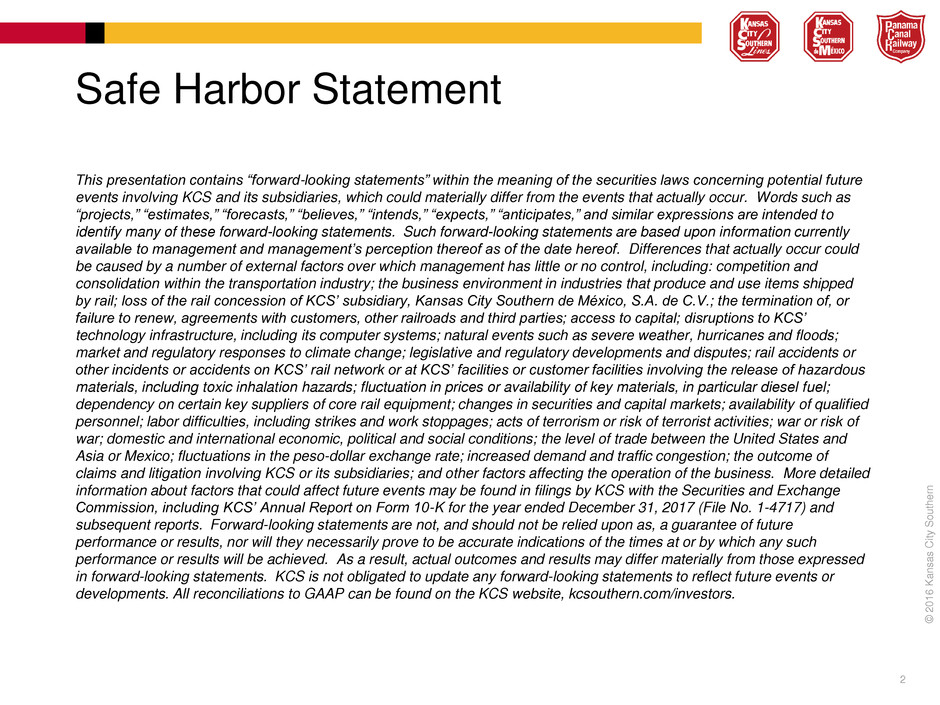
©
2
0
1
6
K
a
n
s
a
s
C
it
y
S
o
u
th
e
rn
Safe Harbor Statement
This presentation contains “forward-looking statements” within the meaning of the securities laws concerning potential future
events involving KCS and its subsidiaries, which could materially differ from the events that actually occur. Words such as
“projects,” “estimates,” “forecasts,” “believes,” “intends,” “expects,” “anticipates,” and similar expressions are intended to
identify many of these forward-looking statements. Such forward-looking statements are based upon information currently
available to management and management’s perception thereof as of the date hereof. Differences that actually occur could
be caused by a number of external factors over which management has little or no control, including: competition and
consolidation within the transportation industry; the business environment in industries that produce and use items shipped
by rail; loss of the rail concession of KCS’ subsidiary, Kansas City Southern de México, S.A. de C.V.; the termination of, or
failure to renew, agreements with customers, other railroads and third parties; access to capital; disruptions to KCS’
technology infrastructure, including its computer systems; natural events such as severe weather, hurricanes and floods;
market and regulatory responses to climate change; legislative and regulatory developments and disputes; rail accidents or
other incidents or accidents on KCS’ rail network or at KCS’ facilities or customer facilities involving the release of hazardous
materials, including toxic inhalation hazards; fluctuation in prices or availability of key materials, in particular diesel fuel;
dependency on certain key suppliers of core rail equipment; changes in securities and capital markets; availability of qualified
personnel; labor difficulties, including strikes and work stoppages; acts of terrorism or risk of terrorist activities; war or risk of
war; domestic and international economic, political and social conditions; the level of trade between the United States and
Asia or Mexico; fluctuations in the peso-dollar exchange rate; increased demand and traffic congestion; the outcome of
claims and litigation involving KCS or its subsidiaries; and other factors affecting the operation of the business. More detailed
information about factors that could affect future events may be found in filings by KCS with the Securities and Exchange
Commission, including KCS’ Annual Report on Form 10-K for the year ended December 31, 2017 (File No. 1-4717) and
subsequent reports. Forward-looking statements are not, and should not be relied upon as, a guarantee of future
performance or results, nor will they necessarily prove to be accurate indications of the times at or by which any such
performance or results will be achieved. As a result, actual outcomes and results may differ materially from those expressed
in forward-looking statements. KCS is not obligated to update any forward-looking statements to reflect future events or
developments. All reconciliations to GAAP can be found on the KCS website, kcsouthern.com/investors.
2
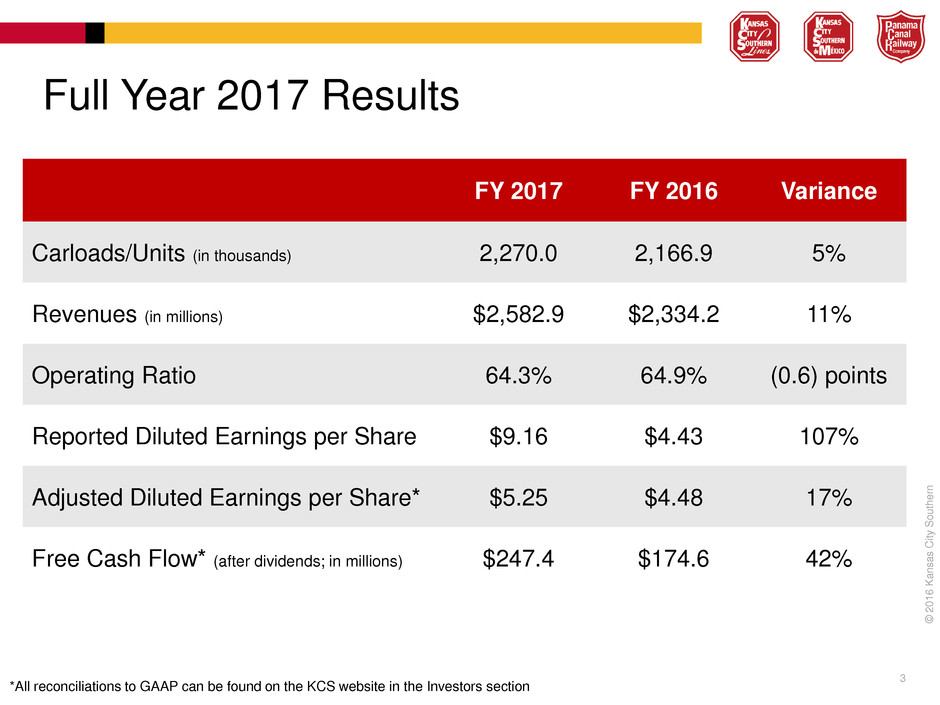
©
2
0
1
6
K
a
n
s
a
s
C
it
y
S
o
u
th
e
rn
Full Year 2017 Results
FY 2017 FY 2016 Variance
Carloads/Units (in thousands) 2,270.0 2,166.9 5%
Revenues (in millions) $2,582.9 $2,334.2 11%
Operating Ratio 64.3% 64.9% (0.6) points
Reported Diluted Earnings per Share $9.16 $4.43 107%
Adjusted Diluted Earnings per Share* $5.25 $4.48 17%
Free Cash Flow* (after dividends; in millions) $247.4 $174.6 42%
3
*All reconciliations to GAAP can be found on the KCS website in the Investors section

©
2
0
1
6
K
a
n
s
a
s
C
it
y
S
o
u
th
e
rn
FY 2018 Volume Outlook – YoY View
No change from outlook presented during Q417 earnings call
4
Outlook Markets Key Drivers
Favorable –
approximately 90%
of volume
• Chemical & Petroleum
• Petroleum: Mexico Energy Reform shipments to see continued growth
• Plastics: Incremental shipments to provide benefits in 2H 2018
• Intermodal
• Additional opportunities for cross-border conversion from truck
• Incremental benefits at Lazaro Cardenas from new port terminal & market share opportunities
• Truck capacity tightening could provide benefits to U.S. business
• Automotive
• Auto volumes expected to grow in-line with Mexico production estimates
• No new plant openings in 2018. BMW & Toyota open; Mercedes/Infiniti begins full production in 2019
• Agriculture & Minerals
• Grain & Food Products demand to remain strong in 2018
• Grain volumes impacted by plant re-location in 2017
• Industrial & Consumer
• Metals strength expected YOY – destined for both U.S. and Mexico markets
• 2017 strength in other carloads (military and cement moves) creates tough YOY comp
• Paper volumes expected to be neutral. Potential impacts from truck capacity could provide upside
Unfavorable –
approximately 10%
of volume
• Energy
• Utility Coal: 2018 volumes expected to decline due to impacts from Texas utility closure
• Frac Sand: Uncertainty remains as West Texas sand mines begin production
• Crude Oil: Continued growth expected in shipments YOY

©
2
0
1
6
K
a
n
s
a
s
C
it
y
S
o
u
th
e
rn
Q1 2018 Revenue, Volume & Expense Trends
Q1 2018 Revenue and Carloads, as of March 10, 2018
5
Favorable: ~79% of volumes
Intermodal:
QTD strength in both Cross-Border & Domestic shipments;
Civil protest activity driving QTD weakness at Lazaro
Chemicals & Petroleum:
Favorable YOY trend continues in Refined Products;
LPG supply into Mexico temporarily reduced by strong seasonal
demand for LPG’s in the U.S. & Canada
Industrial & Consumer:
Strength in U.S. Metals & Other Carloads (military)
Automotive:
Mexico auto production increases, partially offset by civil activity
Unfavorable: ~21% of volumes
Agriculture & Minerals:
Tougher comps & plant stockpiling create volatility in QTD trend –
no change to expectation for FY favorability
Energy:
Closure of KCS-served coal-powered utility plant
Expense Trends:
Casualties:
Derailment activity causing ~$3M YOY increase in casualty expense
Network Congestion:
Congestion driving labor & equipment inefficiencies
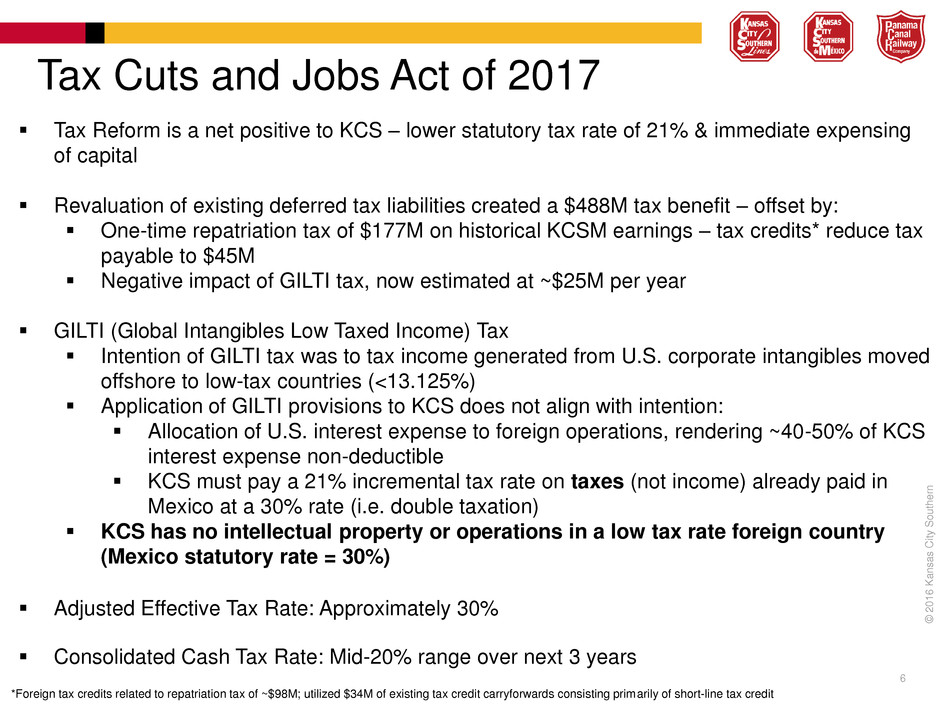
©
2
0
1
6
K
a
n
s
a
s
C
it
y
S
o
u
th
e
rn
Tax Cuts and Jobs Act of 2017
Tax Reform is a net positive to KCS – lower statutory tax rate of 21% & immediate expensing
of capital
Revaluation of existing deferred tax liabilities created a $488M tax benefit – offset by:
One-time repatriation tax of $177M on historical KCSM earnings – tax credits* reduce tax
payable to $45M
Negative impact of GILTI tax, now estimated at ~$25M per year
GILTI (Global Intangibles Low Taxed Income) Tax
Intention of GILTI tax was to tax income generated from U.S. corporate intangibles moved
offshore to low-tax countries (<13.125%)
Application of GILTI provisions to KCS does not align with intention:
Allocation of U.S. interest expense to foreign operations, rendering ~40-50% of KCS
interest expense non-deductible
KCS must pay a 21% incremental tax rate on taxes (not income) already paid in
Mexico at a 30% rate (i.e. double taxation)
KCS has no intellectual property or operations in a low tax rate foreign country
(Mexico statutory rate = 30%)
Adjusted Effective Tax Rate: Approximately 30%
Consolidated Cash Tax Rate: Mid-20% range over next 3 years
6
*Foreign tax credits related to repatriation tax of ~$98M; utilized $34M of existing tax credit carryforwards consisting primarily of short-line tax credit

©
2
0
1
6
K
a
n
s
a
s
C
it
y
S
o
u
th
e
rn
Trade & Regulatory Updates
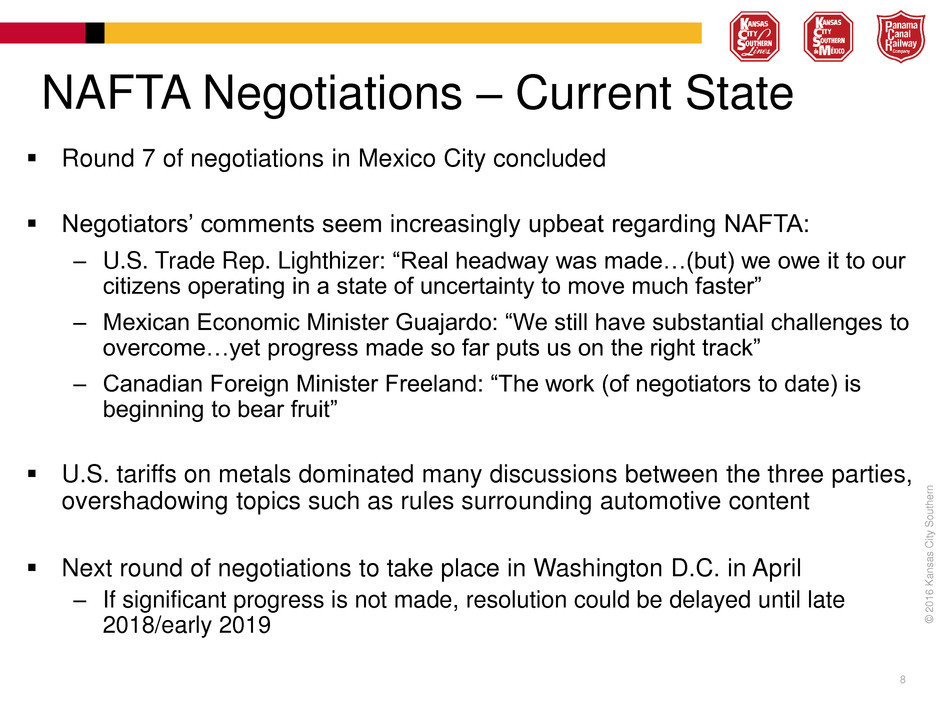
©
2
0
1
6
K
a
n
s
a
s
C
it
y
S
o
u
th
e
rn
NAFTA Negotiations – Current State
Round 7 of negotiations in Mexico City concluded
Negotiators’ comments seem increasingly upbeat regarding NAFTA:
– U.S. Trade Rep. Lighthizer: “Real headway was made…(but) we owe it to our
citizens operating in a state of uncertainty to move much faster”
– Mexican Economic Minister Guajardo: “We still have substantial challenges to
overcome…yet progress made so far puts us on the right track”
– Canadian Foreign Minister Freeland: “The work (of negotiators to date) is
beginning to bear fruit”
U.S. tariffs on metals dominated many discussions between the three parties,
overshadowing topics such as rules surrounding automotive content
Next round of negotiations to take place in Washington D.C. in April
– If significant progress is not made, resolution could be delayed until late
2018/early 2019
8

©
2
0
1
6
K
a
n
s
a
s
C
it
y
S
o
u
th
e
rn
Update on COFECE Investigation
Final Resolution received & communicated on March 8, 2018
– Investigation surrounded effective competition in the Mexican rail
marketplace for interconnection services, trackage rights and
switching rights
Resolution dismisses the preliminary report, originally issued in
March 2017
– COFECE determined that the investigation did not offer adequate
information to issue a declaration on competition conditions
No further amendments or modifications may be made to the
preliminary report
9

©
2
0
1
6
K
a
n
s
a
s
C
it
y
S
o
u
th
e
rn
KCS Cross-Border Overview
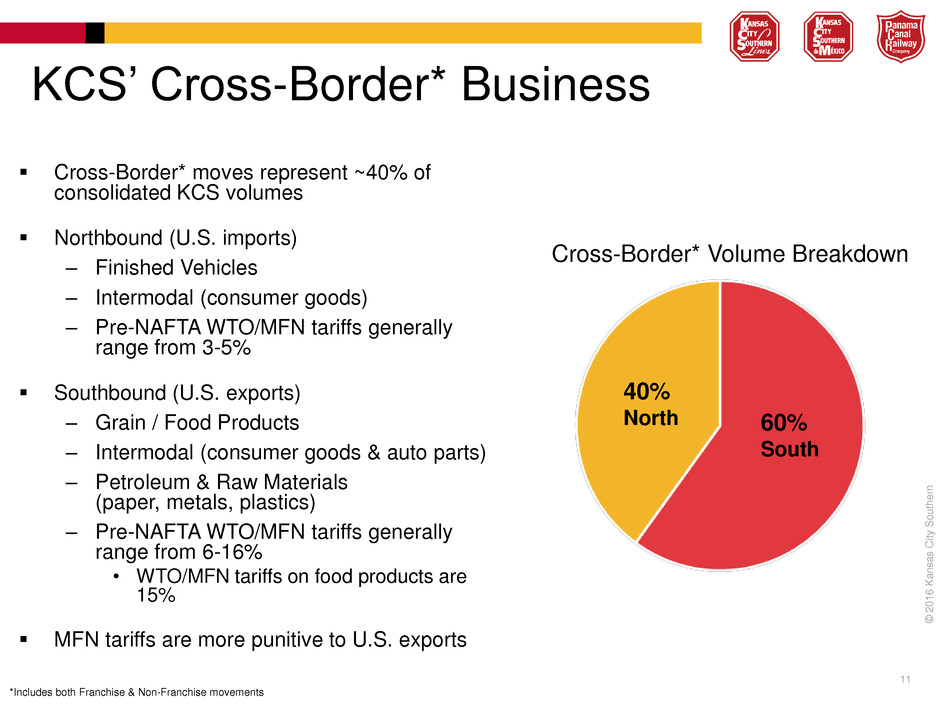
©
2
0
1
6
K
a
n
s
a
s
C
it
y
S
o
u
th
e
rn
KCS’ Cross-Border* Business
Cross-Border* moves represent ~40% of
consolidated KCS volumes
Northbound (U.S. imports)
– Finished Vehicles
– Intermodal (consumer goods)
– Pre-NAFTA WTO/MFN tariffs generally
range from 3-5%
Southbound (U.S. exports)
– Grain / Food Products
– Intermodal (consumer goods & auto parts)
– Petroleum & Raw Materials
(paper, metals, plastics)
– Pre-NAFTA WTO/MFN tariffs generally
range from 6-16%
• WTO/MFN tariffs on food products are
15%
MFN tariffs are more punitive to U.S. exports
11
*Includes both Franchise & Non-Franchise movements
40%
North 60%
South
Cross-Border* Volume Breakdown
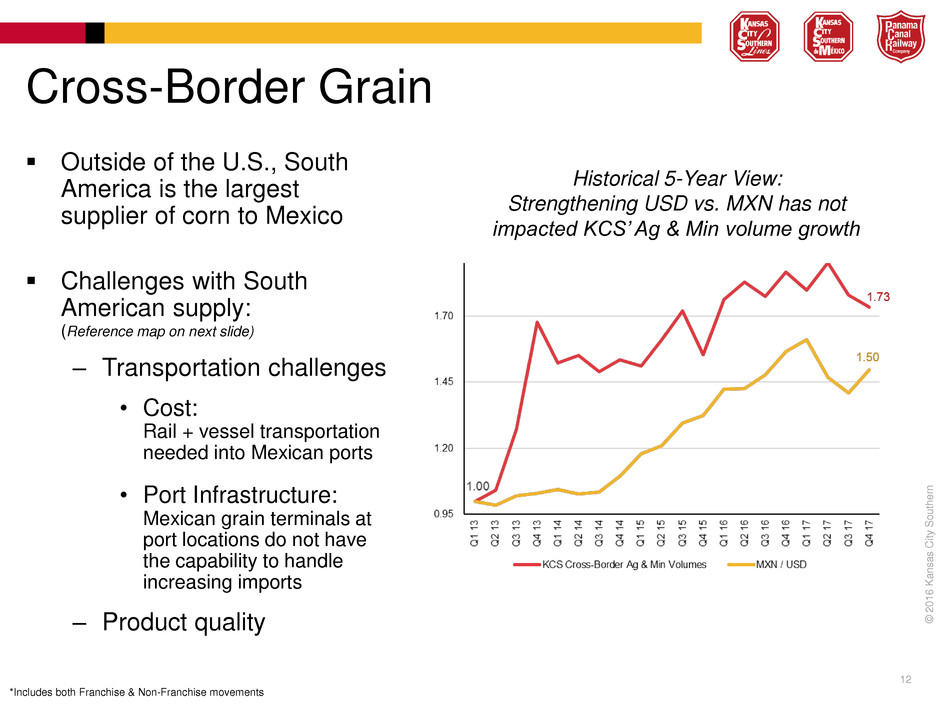
©
2
0
1
6
K
a
n
s
a
s
C
it
y
S
o
u
th
e
rn
Cross-Border Grain
Outside of the U.S., South
America is the largest
supplier of corn to Mexico
Challenges with South
American supply:
(Reference map on next slide)
– Transportation challenges
• Cost:
Rail + vessel transportation
needed into Mexican ports
• Port Infrastructure:
Mexican grain terminals at
port locations do not have
the capability to handle
increasing imports
– Product quality
12
Historical 5-Year View:
Strengthening USD vs. MXN has not
impacted KCS’ Ag & Min volume growth
*Includes both Franchise & Non-Franchise movements

©
2
0
1
6
K
a
n
s
a
s
C
it
y
S
o
u
th
e
rn
13
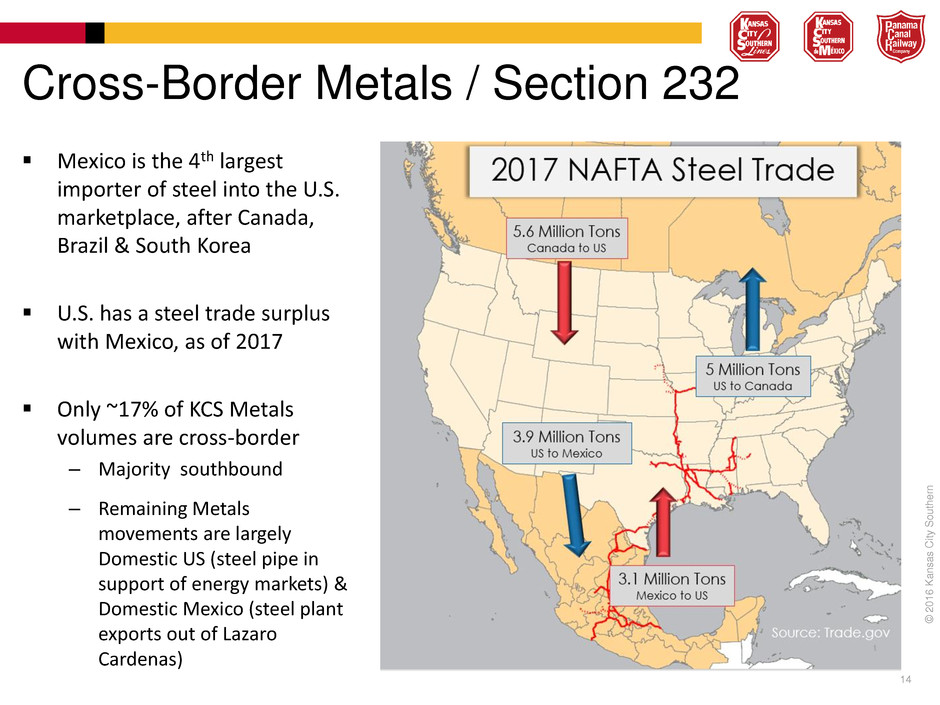
©
2
0
1
6
K
a
n
s
a
s
C
it
y
S
o
u
th
e
rn
Cross-Border Metals / Section 232
Mexico is the 4th largest
importer of steel into the U.S.
marketplace, after Canada,
Brazil & South Korea
U.S. has a steel trade surplus
with Mexico, as of 2017
Only ~17% of KCS Metals
volumes are cross-border
– Majority southbound
– Remaining Metals
movements are largely
Domestic US (steel pipe in
support of energy markets) &
Domestic Mexico (steel plant
exports out of Lazaro
Cardenas)
14

©
2
0
1
6
K
a
n
s
a
s
C
it
y
S
o
u
th
e
rn
Mexico Energy Reform
15
2017 Revenue & Volumes Market Focus Areas
– Emergence of retail outlets -
new suppliers
– Storage capacity
– Pipeline capacity
– Terminal locations –
access to key markets
2018 Storage Capacity Expansions
– Howard Energy
– TCM
– Regulatory permit obtained in
March 2018
– Bulkmatic
Traffic Mix
– 2017 traffic mix composed of
52% LPG / 48% Refined Products
– Expect refined products growth to
outpace LPGs in future years
Source: PLG Consulting

©
2
0
1
6
K
a
n
s
a
s
C
it
y
S
o
u
th
e
rn
16
